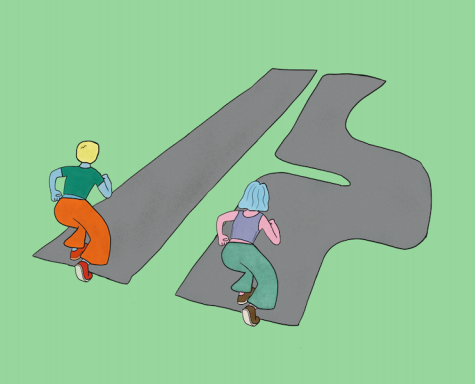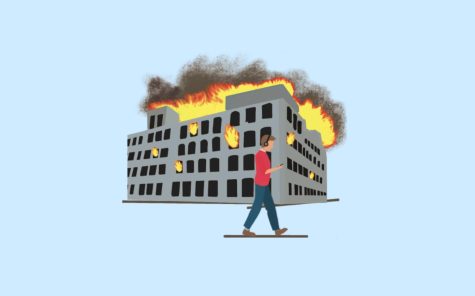I can’t sit still
When I am working on my homework, getting up for a bit and taking a walk helps clear my brain so I can be more productive.
I am neurodivergent, specifically, I have been diagnosed with attention-deficit-hyperactivity disorder. Being forced to sit at a desk for seven hours a day is extremely difficult for me.
There have been many instances where I am instructed by my teacher to do specific work but also am told that I can’t listen to music at this time because it will distract me. For a good chunk of the student body allowing them to listen to music will do the opositte of distracting, instead it will help them focus.
ADHD is not the only disorder that can affect a persons ability to focus. Melinda Ledlow, a clinically licensed counselor at Nurturing Divergence, which specializes in neurodivergent counseling, said autism, depression and anxiety can also lead to this struggle.
For neurodivergent students there are many factors that go into why they may struggle with sitting still, Ledlow explains that these happen because the neurotypical brain has a harder time processing what is going on around them on a sensory level.
“There is often a lot of noise thats happening in the classroom, the temperature is not always great, people are sitting close by… so if you’ve got ADHD and all of these things are happening around you, you’re processing all of this but all of it is not helpful, its gonna make it really, really hard for you to pay attention,” Ledlow said.
The majority of a student’s seven-hour school day is spent sitting at a desk. Whether they are listening to a lecture, talking in groups or working on homework, students are usually expected to stay at that desk.
Throughout my school day, the only times when I am not expected to sit still are passing periods, lunch or specific classes which require me to be up and out of my seat. However, for many students, all seven of their classes are spent at a desk the entire time. This would mean a student might only get 40 minutes throughout their entire day where they are not required to stay seated.
Another portion of a student’s day is Academic Support Time, this allows students time to work on whatever classwork they need to finish. Despite this privilege, many students find this time is less helpful than it could be because of the expectation to stay put.
As a part of the student body, I am grateful for the time I am given to get my work done. However there should be some sort of basic understanding about the importance of allowing students to do what they need in order to be productive.
As someone who struggles with focusing for long periods of time, listening to music or taking a short walk are what allow me to be productive as I am expected. Ledlow emphasizes how it is extremely common for students to fidget in moments when they need to be productive or actively listening.
“You may wring your hands, sometimes there’s hand flapping, picking at your fingernails, picking at your cuticles, playing with your hair. Really any kind of repetitive movement is what you’re looking at when you’re looking at fidgeting,” Ledlow said.
When I am sitting in a classroom and working on my classwork, I should be able to fidget, listen to music or take a walk to help me best.
The school needs to provide more options to students. Simply allowing them to get up and take a quick walk during their free time or listen to music while they work can better accommodate any student who struggles to stay focused.

Anna Bailey is a senior and the Print Editor of “The Express.” This is her third year on staff, having been a writer the first two years. Anna is the secretary for the Drama Club as well as an active member of the theater community. You can normally find her in any and all of the productions BVNW puts on. She is also a co-editor of MUSE, and a part of Quill & Scroll, NHS and NEHS. Outside of school, Anna works as a gymnastics coach at Blue Valley Rec. Anna hopes her senior year will be both a productive and memorable experience.







